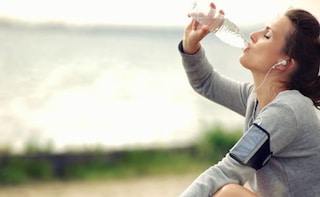Are you drinking 8 glasses of water every day? If not, then now would be a good time to start. While not having sufficient water has many side-effects, it is equally important that we are mindful of 'how' this water is consumed. The principles of Ayurveda suggest that the way you choose to drink water also affects your overall health. Interesting, isn't it? Ancient Ayurveda has numerous theories regarding tips to drink water which have been followed over centuries.According to the book, The Complete Book of Ayurvedic Home Remedies by Vasant Lad, water is the manifestation of consciousness. Water is fluid, heavy, soft, vicious, cold, dense and cohesive. It brings molecules together. Water is a chemical energy, which means it is a universal chemical solvent. Water exists in the body as plasma, cytoplasm, serum, saliva, nasal secretion, cerebrospinal fluid, urine and sweat. It is therefore necessary for absorption of nutrition and to maintain life; without it, our cells cannot survive. Considering how essential water is to human life, here are some handy yet important Ayurvedic tips to drink water.
The water stored in copper and silver vessels helps cure all doshas in your bodyImportant Tips for Drinking Water in SummerAccording to Dr. Keerti Gupta from Kirti Ayurvedic Hospital & Research Center, "Summer is called as the "Pitta Season" and afternoon time is Pitta Kaal, which is hottest time of the day, therefore, Ayurveda suggests that you should drink maximum water during this period so as to maintain the body temperature. You could also incorporate some small changes including adding Pitta pacifying ingredients in water that help maintain body heat. Some of the ingredients include lemon, mint, kokum, and fennel seeds,khaskhas and rose petals.
Advertisement
Advertisement
Advertisement
Advertisement
The water stored in copper and silver vessels helps cure all doshas in your bodyImportant Tips for Drinking Water in Summer
For the latest food news, health tips and recipes, like us on Facebook or follow us on Twitter and YouTube.
Advertisement
